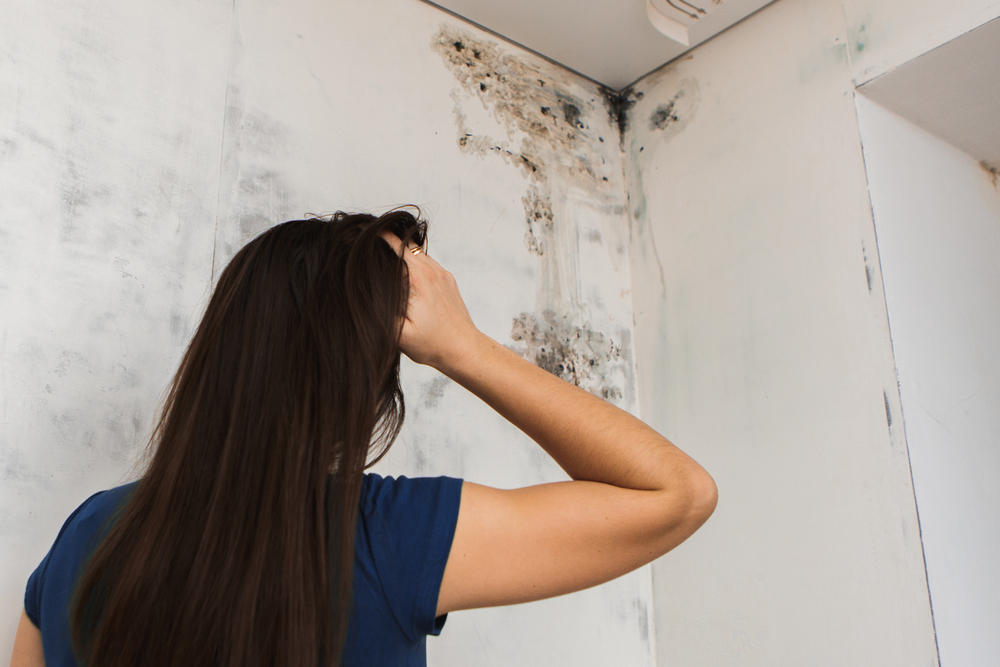
Dealing with Mold: Introduction
Hurricane season in Florida is always stressful for residents as they brace themselves for the potential destruction that these powerful storms can bring. However, once the winds die down and the rains stop, another battle begins – the battle against mold. In this blog post, we will discuss the challenges that Florida residents face when dealing with mold after a hurricane and offer tips on preventing and removing mold in your home.
What is mold, and why is it a problem after a hurricane?
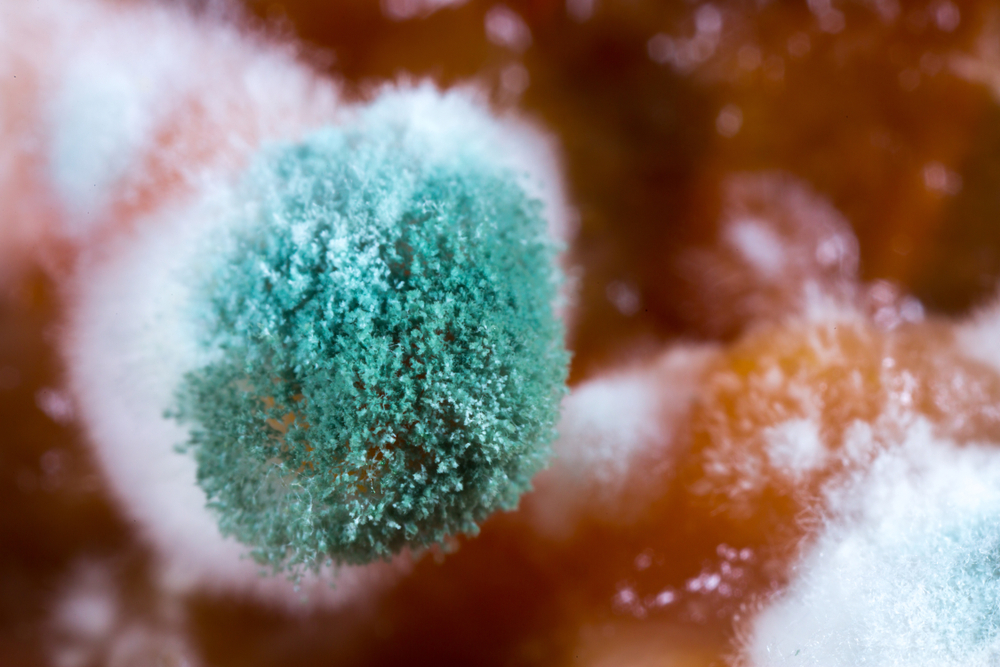
Mold is a type of fungus that thrives in damp and humid environments. After a hurricane, homes and buildings can become exposed to water damage, leading to mold growth. This is particularly problematic in Florida, where the high humidity levels make it easy for mold to grow and spread quickly. Not only is mold unsightly, but it can also cause health problems, such as respiratory issues and allergic reactions.
How to prevent mold after a hurricane.
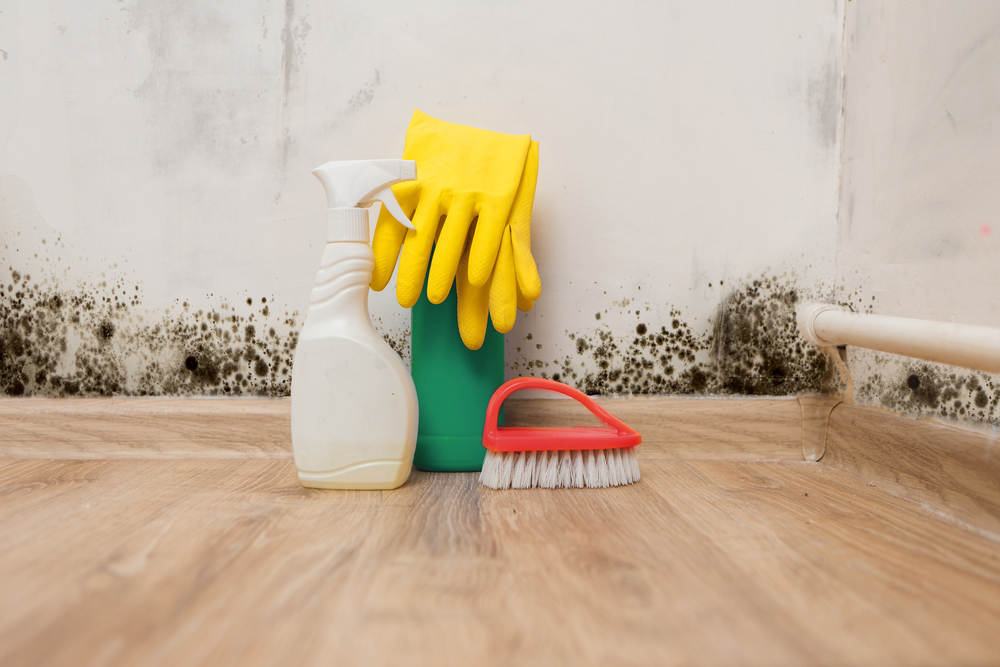
The best way to deal with mold is to prevent it from happening in the first place. Here are some tips to help prevent mold after a hurricane:
- Remove standing water and dry wet areas as soon as possible.
- Clean and disinfect any surfaces that were exposed to floodwater.
- Use dehumidifiers and fans to dry out wet areas.
- Keep the humidity levels in your home low by using air conditioning or opening windows.
- Keep an eye out for signs of mold growth, such as musty odors or discoloration on walls or ceilings.
Identifying and removing mold.
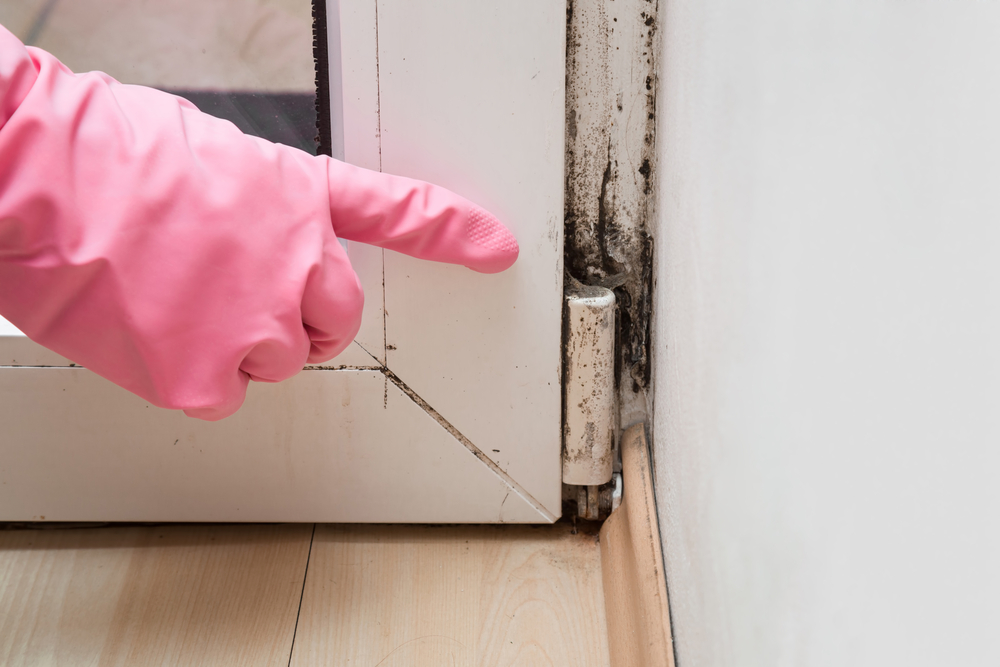
Even with preventative measures, mold can still grow in your home after a hurricane. Here are some steps to take when identifying and removing mold:
- Identify the source of the mold – this could be a leaky roof, a damp basement, or a flooded area.
- Use protective gear, such as gloves and a mask, when handling mold.
- Clean the affected area with one cup of bleach to one gallon of water.
- Scrub the area thoroughly and let it dry completely.
- Consider hiring a professional mold remediation company if the infestation is extensive.
How to protect yourself and your family from the health effects of mold.
Mold can cause health problems, especially for people with allergies or asthma. Here are some tips to help protect yourself and your family from the health effects of mold:
- Keep the humidity levels in your home low to prevent mold growth.
- Use air purifiers to remove mold spores from the air.
- Keep windows and doors open to allow fresh air to circulate.
- Stay away from moldy areas as much as possible.
- If you or a family member experiences symptoms such as headaches, sneezing, or coughing, consult a doctor.
How to file an insurance claim for mold damage.
If your home is damaged by mold after a hurricane, you may be able to file a claim with your insurance company. However, it’s important to note that not all insurance policies cover mold damage. Here are some tips for filing an insurance claim for mold damage:
- Document the damage by taking photos and videos of the affected areas.
- Keep receipts and invoices for any repairs or remediation work you have done.
- Contact your insurance company as soon as possible to report the damage.
- Be prepared to provide documentation of the damage and any job done.
Dealing with mold: Conclusion
Dealing with mold after a hurricane is unfortunate for many Florida residents. However, by understanding the connection between hurricanes and mold growth, taking swift action to remove mold, and taking steps to prevent it from growing, homeowners can help protect their homes and their health if they suspect mold in their homes after a hurricane. In that case, it’s essential to seek professional help to remove it safely and effectively.

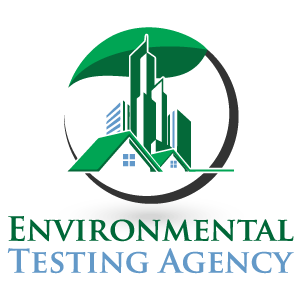

I agree with your point of view, your article has given me a lot of help and benefited me a lot. Thanks. Hope you continue to write such excellent articles.
Reading your article helped me a lot and I agree with you. But I still have some doubts, can you clarify for me? I’ll keep an eye out for your answers.
Reading your article helped me a lot and I agree with you. But I still have some doubts, can you clarify for me? I’ll keep an eye out for your answers.
For my thesis, I consulted a lot of information, read your article made me feel a lot, benefited me a lot from it, thank you for your help. Thanks!
Very nice post. I just stumbled upon your blog and wanted to say that I’ve really enjoyed browsing your blog posts. In any case I’ll be subscribing to your feed and I hope you write again soon!
Do you mind if I quote a couple of your articles as long asI provide credit and sources back to your website?My blog site is in the very same niche as yours and my users would certainly benefit from some of the information you present here.Please let me know if this okay with you. Thanks!
I have read your article carefully and I agree with you very much. This has provided a great help for my thesis writing, and I will seriously improve it. However, I don’t know much about a certain place. Can you help me?
Thank you for your sharing. I am worried that I lack creative ideas. It is your article that makes me full of hope. Thank you. But, I have a question, can you help me?
Your article helped me a lot, is there any more related content? Thanks!
Thanks for sharing. I read many of your blog posts, cool, your blog is very good.
Your point of view caught my eye and was very interesting. Thanks. I have a question for you.
Im grateful for the post.Really thank you! Much obliged.
Your point of view caught my eye and was very interesting. Thanks. I have a question for you.
Can you be more specific about the content of your article? After reading it, I still have some doubts. Hope you can help me.
Can you be more specific about the content of your article? After reading it, I still have some doubts. Hope you can help me.
Can you be more specific about the content of your article? After reading it, I still have some doubts. Hope you can help me.
Can I simply say what a relief to uncover somebody that truly understands what they are discussing over the internet. You certainly know how to bring an issue to light and make it important. A lot more people must look at this and understand this side of your story. I was surprised that you are not more popular given that you most certainly have the gift.
Thanks for sharing. I read many of your blog posts, cool, your blog is very good.
I don’t think the title of your article matches the content lol. Just kidding, mainly because I had some doubts after reading the article.
That is a really good tip particularly to those fresh to the blogosphere. Simple but very precise info… Thanks for sharing this one. A must read post!
Your article helped me a lot, is there any more related content? Thanks! https://www.binance.com/de-CH/register?ref=IJFGOAID
Good post. I learn something totally new and challenging on blogs I stumbleupon on a daily basis. Its always useful to read content from other authors and practice something from their websites.
You completed various fine points there. I did a search on the theme and found the majority of people will go along with with your blog.
Your point of view caught my eye and was very interesting. Thanks. I have a question for you. https://www.binance.com/uk-UA/register?ref=PORL8W0Z
I am an investor of gate io, I have consulted a lot of information, I hope to upgrade my investment strategy with a new model. Your article creation ideas have given me a lot of inspiration, but I still have some doubts. I wonder if you can help me? Thanks.
Thank you for your sharing. I am worried that I lack creative ideas. It is your article that makes me full of hope. Thank you. But, I have a question, can you help me? https://www.binance.com/uk-UA/register?ref=FIHEGIZ8
Thank you for your sharing. I am worried that I lack creative ideas. It is your article that makes me full of hope. Thank you. But, I have a question, can you help me? https://www.binance.com/bg/register?ref=V2H9AFPY
I don’t think the title of your article matches the content lol. Just kidding, mainly because I had some doubts after reading the article. https://www.binance.com/bg/register?ref=PORL8W0Z
After reading your article, it reminded me of some things about gate io that I studied before. The content is similar to yours, but your thinking is very special, which gave me a different idea. Thank you. But I still have some questions I want to ask you, I will always pay attention. Thanks.
Your article made me suddenly realize that I am writing a thesis on gate.io. After reading your article, I have a different way of thinking, thank you. However, I still have some doubts, can you help me? Thanks.
Your article made me suddenly realize that I am writing a thesis on gate.io. After reading your article, I have a different way of thinking, thank you. However, I still have some doubts, can you help me? Thanks.
At the beginning, I was still puzzled. Since I read your article, I have been very impressed. It has provided a lot of innovative ideas for my thesis related to gate.io. Thank u. But I still have some doubts, can you help me? Thanks.
At the beginning, I was still puzzled. Since I read your article, I have been very impressed. It has provided a lot of innovative ideas for my thesis related to gate.io. Thank u. But I still have some doubts, can you help me? Thanks.
Thanks for sharing. I read many of your blog posts, cool, your blog is very good. https://www.binance.com/ru-UA/register?ref=UM6SMJM3
After reading your article, I have some doubts about gate.io. I don’t know if you’re free? I would like to consult with you. thank you.
Your article helped me a lot, is there any more related content? Thanks! https://accounts.binance.com/es/register?ref=V2H9AFPY
Thank you for your sharing. I am worried that I lack creative ideas. It is your article that makes me full of hope. Thank you. But, I have a question, can you help me?
Thank you for your sharing. I am worried that I lack creative ideas. It is your article that makes me full of hope. Thank you. But, I have a question, can you help me? https://www.binance.com/id/register?ref=FIHEGIZ8
Não acho que o título do seu artigo corresponda ao conteúdo lol. Brincadeira, principalmente porque fiquei com algumas dúvidas depois de ler o artigo.
Your point of view caught my eye and was very interesting. Thanks. I have a question for you. https://accounts.binance.com/bg/register-person?ref=OMM3XK51
I am a student of BAK College. The recent paper competition gave me a lot of headaches, and I checked a lot of information. Finally, after reading your article, it suddenly dawned on me that I can still have such an idea. grateful. But I still have some questions, hope you can help me.
The point of view of your article has taught me a lot, and I already know how to improve the paper on gate.oi, thank you. https://www.gate.io/th/signup/XwNAU
I am a student of BAK College. The recent paper competition gave me a lot of headaches, and I checked a lot of information. Finally, after reading your article, it suddenly dawned on me that I can still have such an idea. grateful. But I still have some questions, hope you can help me.
Your enticle helped me a lot, is there any more related content? Thanks! https://accounts.binance.com/en/register-person?ref=P9L9FQKY
Your enticle helped me a lot, is there any more related content? Thanks! https://www.binance.com/en/register?ref=P9L9FQKY
I may need your help. I tried many ways but couldn’t solve it, but after reading your article, I think you have a way to help me. I’m looking forward for your reply. Thanks.
Thank you for your shening. I am worried that I lack creative ideas. It is your enticle that makes me full of hope. Thank you. But, I have a question, can you help me? https://accounts.binance.com/en/register-person?ref=P9L9FQKY
The point of view of your article has taught me a lot, and I already know how to improve the paper on gate.oi, thank you. https://www.gate.io/ar/signup/XwNAU
I am trying to start a formal, influential blog and I want to make sure it is professional. Since I have little to no blogging experience, I am trying to save some time by asking you..
The point of view of your article has taught me a lot, and I already know how to improve the paper on gate.oi, thank you. https://www.gate.io/ru/signup/XwNAU
Thanks for shening. I read many of your blog posts, cool, your blog is very good. https://www.binance.com/en/register?ref=P9L9FQKY
I may need your help. I tried many ways but couldn’t solve it, but after reading your article, I think you have a way to help me. I’m looking forward for your reply. Thanks.
This article opened my eyes, I can feel your mood, your thoughts, it seems very wonderful. I hope to see more articles like this. thanks for sharing.
This article opened my eyes, I can feel your mood, your thoughts, it seems very wonderful. I hope to see more articles like this. thanks for sharing.
Thank you for your sharing. I am worried that I lack creative ideas. It is your article that makes me full of hope. Thank you. But, I have a question, can you help me? https://accounts.binance.com/ru-UA/register-person?ref=DB40ITMB
I don’t think the title of your article matches the content lol. Just kidding, mainly because I had some doubts after reading the article. https://accounts.binance.com/pt-PT/register-person?ref=IJFGOAID
I don’t think the title of your article matches the content lol. Just kidding, mainly because I had some doubts after reading the article. https://www.binance.com/sv/register?ref=FIHEGIZ8
Hmm is anyone else having problems with the images on this
blog loading? I’m trying to determine if its a problem on my end or if it’s the
blog. Any responses would be greatly appreciated.
Thank you for another magnificent post. Where else may
just anybody get that kind of information in such a perfect approach of writing?
I have a presentation subsequent week, and I’m on the look
for such information.
Very quickly this website will be famous among all blogging users,
due to it’s pleasant articles
What’s up, after reading this awesome piece of writing i
am also glad to share my know-how here with mates.
My brother suggested I might like this website.
He was totally right. This post truly made my day.
You cann’t imagine simply how much time I had spent for this information! Thanks!
This text is invaluable. Where can I find out more?
Your article helped me a lot, is there any more related content? Thanks! https://accounts.binance.com/ph/register?ref=53551167
Someone necessarily lend a hand to make critically articles I would state.
This is the very first time I frequented your website page and so far?
I amazed with the analysis you made to make this actual put up incredible.
Fantastic process!
Wow that was unusual. I just wrote an incredibly long comment but after
I clicked submit my comment didn’t show up.
Grrrr… well I’m not writing all that over again.
Anyway, just wanted to say great blog!
Thanks for this excellent article. One more thing to mention is that the majority of digital cameras are available equipped with the zoom lens that enables more or less of the scene to generally be included simply by ‘zooming’ in and out. These changes in {focus|focusing|concentration|target|the a**** length are reflected inside viewfinder and on substantial display screen right on the back of the particular camera.
I don’t think the title of your article matches the content lol. Just kidding, mainly because I had some doubts after reading the article. https://www.binance.com/pt-PT/register?ref=B4EPR6J0
I don’t think the title of your article matches the content lol. Just kidding, mainly because I had some doubts after reading the article. https://accounts.binance.com/ru/register?ref=W0BCQMF1
I have been surfing online greater than three hours lately, yet I never discovered any fascinating article like yours. It¦s beautiful value enough for me. Personally, if all website owners and bloggers made excellent content material as you did, the web will be a lot more helpful than ever before.
Your article helped me a lot, is there any more related content? Thanks! https://www.binance.com/ru-UA/register?ref=RQUR4BEO
Hey very cool site!! Man .. Beautiful .. Amazing .. I’ll bookmark your site and take the feeds also…I’m happy to find numerous useful information here in the post, we need work out more strategies in this regard, thanks for sharing. . . . . .
I not to mention my guys happened to be reading through the great guides located on the website and all of the sudden I had an awful feeling I had not expressed respect to the web blog owner for those secrets. All the boys are actually absolutely glad to read through all of them and have unquestionably been loving these things. Appreciation for truly being quite considerate and then for pick out this sort of amazing areas millions of individuals are really wanting to learn about. My sincere apologies for not saying thanks to you earlier.
Can you be more specific about the content of your article? After reading it, I still have some doubts. Hope you can help me. https://www.binance.com/ka-GE/register?ref=53551167
Thank you for your sharing. I am worried that I lack creative ideas. It is your article that makes me full of hope. Thank you. But, I have a question, can you help me? https://accounts.binance.com/it/register-person?ref=GJY4VW8W
Incredible! This blog looks just like my old one! It’s on a totally different topic but it has pretty much the same page layout and design. Great choice of colors!
My brother suggested I might like this web site. He was totally right. This post truly made my day. You cann’t imagine simply how much time I had spent for this information! Thanks!
I believe you have mentioned some very interesting points, regards for the post.
I?¦ve recently started a website, the info you offer on this site has helped me greatly. Thanks for all of your time & work.
I’m no longer certain where you are getting your information, but great topic.
I needs to spend some time learning much more or working out more.
Thanks for fantastic info I used to be looking for
this info for my mission.
powered by GoToTop.ee
https://ru.gototop.ee/
I am constantly browsing online for articles that can aid me. Thx!
Pretty! This has been an extremely wonderful post.
Many thanks for providing this info.
powered by GoToTop.ee
https://ru.gototop.ee/
Howdy! Someone in my Myspace group shared this site with us so I came to check it out. I’m definitely enjoying the information. I’m bookmarking and will be tweeting this to my followers! Wonderful blog and fantastic design.
I’m curious to find out what blog system you happen to be working with? I’m experiencing some minor security problems with my latest blog and I would like to find something more risk-free. Do you have any recommendations?
Howdy! I’m at work surfing around your blog from my new iphone! Just wanted to say I love reading your blog and look forward to all your posts! Keep up the superb work!
Utterly written content material, Really enjoyed looking at.
Hola! I’ve been following your web site for some time now and finally got the courage to go ahead and give you a shout out from New Caney Texas!
Just wanted to tell you keep up the excellent work!
I am currently writing a paper that is very related to your content. I read your article and I have some questions. I would like to ask you. Can you answer me? I’ll keep an eye out for your reply. 20bet
Good write-up, I¦m normal visitor of one¦s site, maintain up the excellent operate, and It is going to be a regular visitor for a long time.
Hello, i think that i saw you visited my weblog thus i came
to “return the favor”.I am attempting to find things to improve my
site!I suppose its ok to use a few of your
ideas!!
Some times its a pain in the ass to read what people wrote but this internet site is real user pleasant! .
I conceive other website proprietors should take this web site as an example , very clean and superb user friendly layout.
This post will help the internet viewers for building up new website or even a weblog from start to end.
Wow! Thank you! I continuously wanted to write on my website something like that. Can I include a part of your post to my site?
Thank you for the good writeup. It in fact was a amusement account it.
Look advanced to more added agreeable from you!
However, how could we communicate?
Hello there, just turned into aware of your blog thru Google, and located that it’s truly informative. I’m gonna be careful for brussels. I will be grateful if you continue this in future. Numerous other people might be benefited out of your writing. Cheers!
Hi there, I discovered your website by the use of Google even as looking for a comparable topic, your site got here up, it seems to be great. I have bookmarked it in my google bookmarks.
I visit every day some sites and blogs to read articles or reviews, however this webpage provides quality based articles.
Valuable info. Lucky me I discovered your website accidentally, and I am stunned why this accident didn’t took place in advance!
I bookmarked it.
You made your point extremely clearly..
he blog was how do i say it… relevant, finally something that helped me. Thanks
Thank you very much for sharing, I learned a lot from your article. Very cool. Thanks. nimabi
This text is priceless. Where can I find out more?
What’s up, the whole thing is going nicely here and ofcourse
every one is sharing data, that’s genuinely excellent,
keep up writing.
Thank you very much for sharing, I learned a lot from your article. Very cool. Thanks. nimabi
Thank you very much for sharing, I learned a lot from your article. Very cool. Thanks. nimabi
Thank you very much for sharing, I learned a lot from your article. Very cool. Thanks. nimabi
I’ll right away grab your rss feed as I can’t find your email subscription link or e-newsletter service. Do you have any? Kindly allow me realize in order that I could subscribe. Thanks.
It¦s really a nice and useful piece of information. I am happy that you just shared this helpful info with us. Please stay us up to date like this. Thanks for sharing.
Fantastic website you have here but I was wondering if you knew of any community forums that cover the same topics discussed in this article? I’d really love to be a part of community where I can get suggestions from other knowledgeable individuals that share the same interest. If you have any suggestions, please let me know. Thanks a lot!
Peculiar article, exactly what I was looking for.
I’m not sure where you’re getting your info, but great topic. I needs to spend some time learning more or understanding more. Thanks for wonderful info I was looking for this information for my mission.
This page definitely has all of the information I wanted concerning this subject and didn’t know who to ask.
Awesome post.
This website was… how do I say it? Relevant!! Finally I have found something which helped me. Thanks!
You have brought up a very fantastic details , thanks for the post.
I’ve been surfing online greater than three hours lately, but I never found any interesting article like yours. It is lovely price sufficient for me. Personally, if all website owners and bloggers made just right content as you probably did, the internet will probably be much more useful than ever before.
Awesome post.
Appreciate the recommendation. Will try it out.
I think this is one of the most important information for me. And i am glad reading your article. But should remark on few general things, The web site style is great, the articles is really nice : D. Good job, cheers
Nice post. I used to be checking constantly this weblog and I am inspired! Extremely helpful information specially the final section 🙂 I maintain such information much. I was seeking this particular information for a long time. Thanks and good luck.
Do you mind if I quote a couple of your articles as long as I provide credit and sources back to your blog? My blog site is in the very same area of interest as yours and my users would truly benefit from some of the information you present here. Please let me know if this ok with you. Thanks!
Hello There. I found your blog using msn. This is a really well written article. I will make sure to bookmark it and return to read more of your useful info. Thanks for the post. I’ll definitely comeback.
Heya i’m for the first time here. I came across this board and I find It really useful & it helped me out a lot. I hope to give something back and aid others like you helped me.
Fantastic write ups With thanks.
Can you be more specific about the content of your article? After reading it, I still have some doubts. Hope you can help me. https://www.binance.info/zh-CN/join?ref=DB40ITMB
It’s not my first time to pay a quick visit this web site, i am visiting this web site dailly and take fastidious information from here daily.
Thanks! I enjoy this.
Many thanks, Plenty of content!
continuously i used to read smaller articles or reviews which as well clear their motive, and that is also happening with this post which I am reading at this time.
Your article helped me a lot, is there any more related content? Thanks! https://accounts.binance.com/vi/register-person?ref=B4EPR6J0